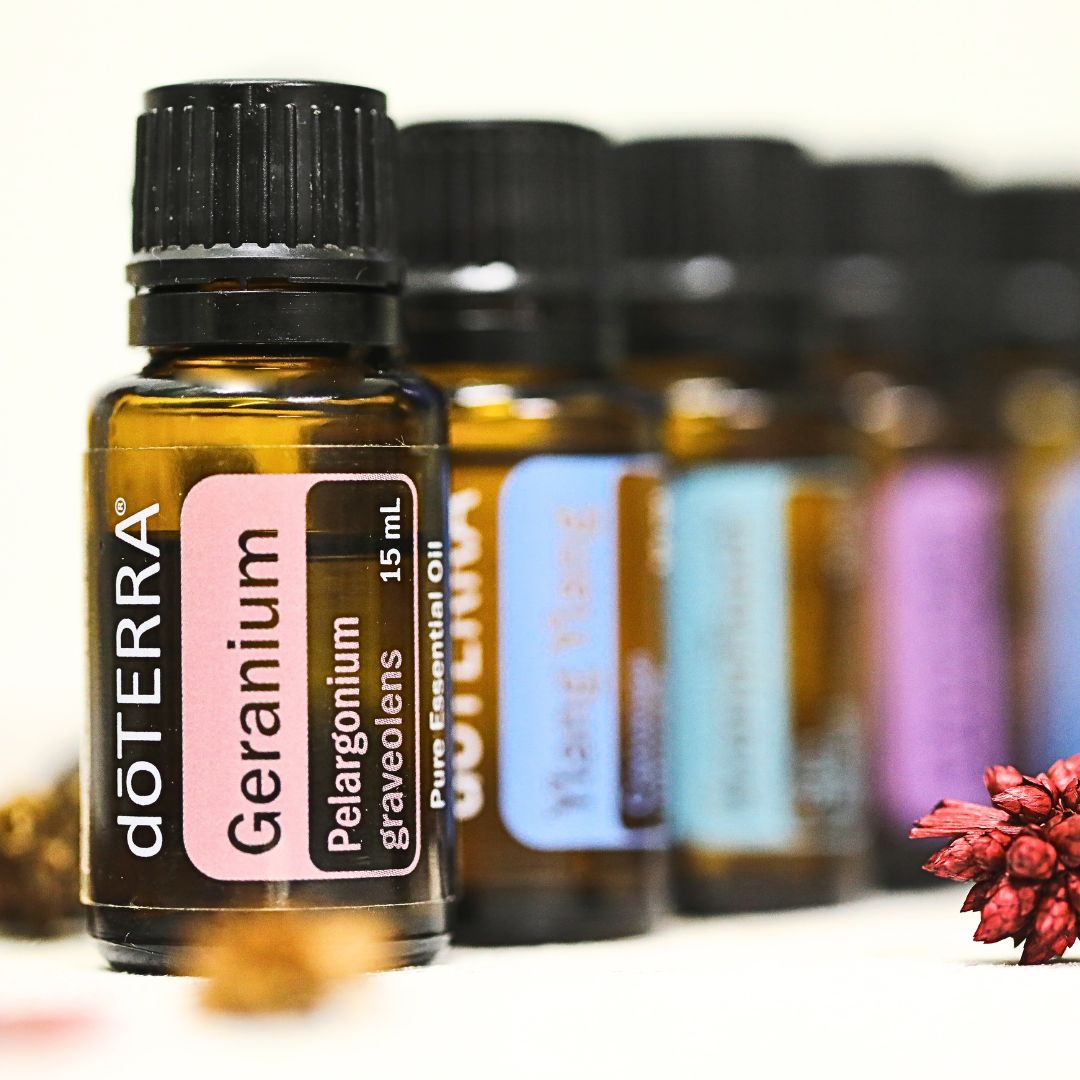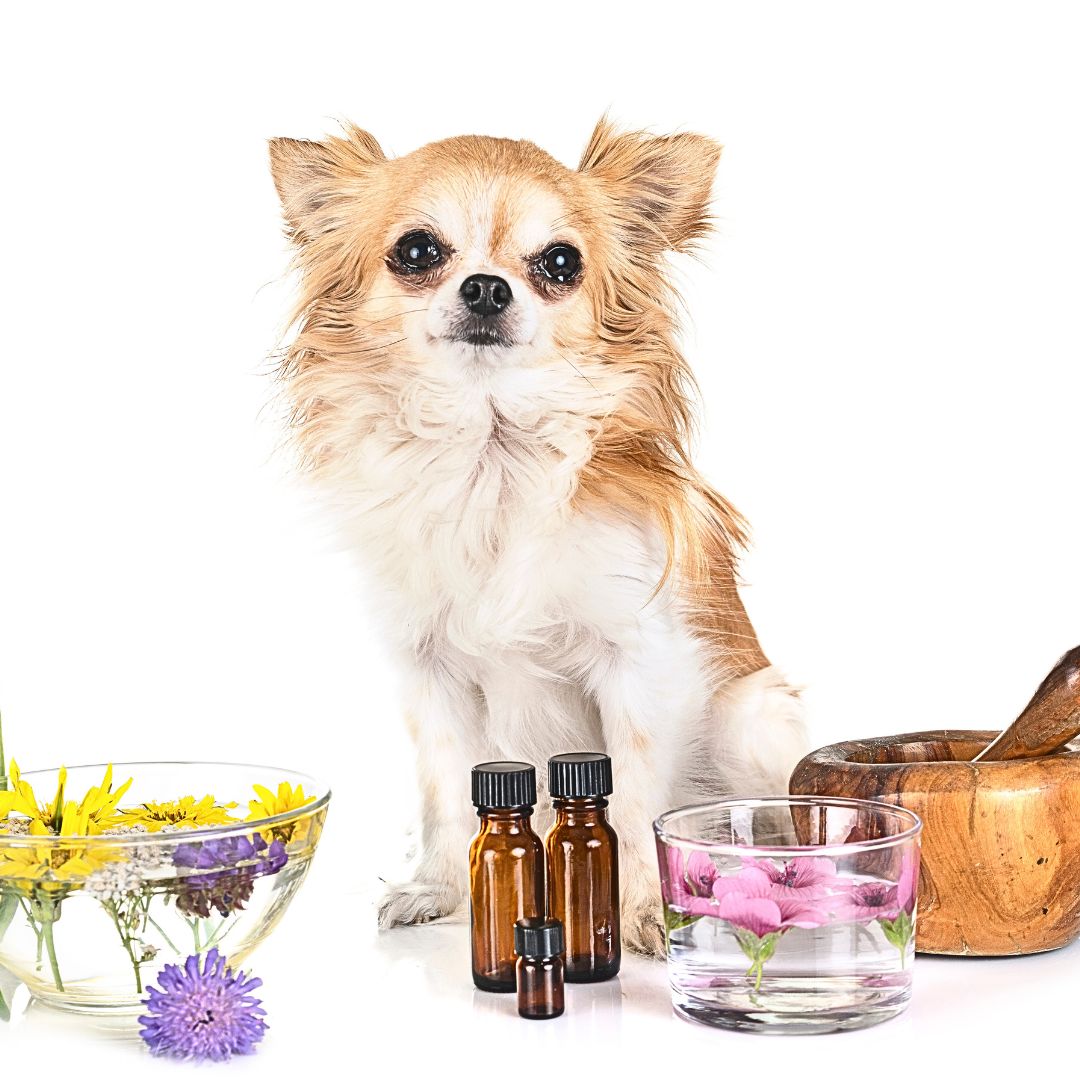Discover the ultimate guide to using essential oils safely for your beloved canine companions. Uncover the benefits and precautions of incorporating essential oils into your dog’s wellness routine, ensuring their health and happiness for years.
The popularity of essential oils has increased for various benefits—many health benefits for humans and pets. When using essential oils for dogs, it’s important to understand their proper use and potential risks. Here’s a guide to help you navigate the world of essential oils for dogs.
AKA suggested that Intriguing studies are beginning to shed light on the powerful benefits of essential oils derived from concentrated plant extracts. These potent oils have the potential to offer a wide range of effects and health benefits for dogs and humans; many holistic veterinarians incorporate essential oils into their practices. While there is currently limited scientific evidence regarding the effectiveness of essential oils in treating various illnesses in dogs, many owners are still willing to explore their use for a wide range of conditions. These conditions include anxiety, skin problems, and more—flea and tick prevention; the most important tick-borne disease that affects dogs is Lyme disease.
First and Foremost
It’s vital to consult with your veterinarian before introducing essential oils to your dog’s routine. While some essential oils can offer positive effects, others may be harmful or toxic to dogs. Your vet can guide you on which oils are safe and appropriate for your dog’s needs.
When using essential oils for dogs, remember that their sense of smell is much more sensitive than ours. It’s necessary to dilute the oil appropriately before applying or using it in a diffuser; cut in a carrier oil to avoid any potential skin irritations or reactions.
Certain essential oils can be beneficial for dogs in various ways.
Lavender oil has calming properties and helps to reduce anxiety in dogs. Peppermint oil may aid in relieving digestive issues or repelling fleas and ticks. However, always ensure you are using high-quality, pure essential oils specifically formulated for use with animals.
When introducing essential oils, start with small amounts and closely monitor their reaction. Signs of distress or discomfort should be taken seriously, and immediate action should be taken by contacting your vet.
In addition to proper dilution and monitoring, storing essential oils safely out of your dog’s reach is important. Accidental ingestion can lead to severe health issues.
The benefits of Lavender oil include the following
Calming and Relaxing
Lavender oil has natural calming properties that reduce anxiety and stress in dogs. It can be a great aid during car rides, fireworks, thunderstorms, or other stressful situations.
Soothing Skin Irritations
Lavender oil has anti-inflammatory and antiseptic properties, effectively soothing skin irritations like allergies, hot spots, and insect bites. It can also help relieve itchiness and promote faster healing.
Natural Flea Repellent
Lavender oil has been known to repel fleas due to its strong scent. Using lavender-infused products or diluting lavender oil in water as a spray can help keep fleas away from your furry friend.
Pain Relief
Lavender oil’s analgesic properties benefit dogs experiencing joint pain, muscle soreness, or general discomfort. It can be used topically by applying a diluted solution to the affected area for relief.
Freshening Coat
Lavender oil has a pleasant aroma that can help eliminate odours from your dog’s coat. One way to make your dog smell fresh and clean is by lightly misting their fur with lavender oil to water.
It is important to note that when using lavender oil on dogs, it should always be diluted properly to avoid adverse effects. Additionally, it is recommended to consult your veterinarian before using essential oils, especially if they have any underlying health conditions or are pregnant or nursing.
The Top 10 Dog-Friendly Essential Oils and Their Specific Uses in Canine Aromatherapy
If you’re a dog owner who loves using essential oils, knowing which ones are safe for your furry friend is important. Here are the top 10 dog-friendly essential oils and their specific uses in canine aromatherapy:
1. Lavender
Its calming properties, lavender oil, can help reduce anxiety and relaxation in dogs. It’s great to use during stressful situations like thunderstorms or car rides.
2. Chamomile
This gentle oil is often used to soothe dog skin irritations and allergies. It can also help with anxiety and digestive issues.
3. Frankincense
Frankincense oil is anti-inflammatory and can benefit dogs with arthritis or joint pain. It also promotes relaxation and emotional balance.
4. Cedarwood
Cedarwood oil is a natural insect repellent, making it useful in repelling fleas and ticks. It can also help soothe itchy skin.
5. Peppermint
Peppermint oil can relieve nausea and aid digestion in dogs. It’s also an effective natural flea repellent and can provide a refreshing scent.
6. Eucalyptus
Eucalyptus oil can help clear congestion in dogs with respiratory issues. However, it should be used cautiously, in diluted amounts, and known for respiratory benefits.
7. Lemongrass
Lemongrass oil has antibacterial and antifungal properties and is useful for treating skin infections or irritations in dogs. It can also help repel insects.
8. Rosemary
Rosemary oil is often used to promote circulation in dogs, benefiting older dogs or those with arthritis. It’s also known to stimulate hair growth and improve coat health.
9. Ginger
Ginger oil is great for soothing upset stomachs and relieving dog nausea. It can be helpful during car rides or if your dog is experiencing digestive issues.
10. Sweet Orange
Sweet orange oil has an uplifting and refreshing scent that can help improve your dog’s mood. It’s also great for deodorizing and can be used in homemade grooming products.
Remember, when using essential oils on your dog, always dilute them properly and start with small amounts to ensure no adverse reactions. It’s also important to consult a veterinarian before using essential oils, especially if your dog has pre-existing health conditions.
A Holistic Approach: Integrating Essential Oil Usage into Your Dog’s Wellness Routine
Introducing essential oils into your dog’s wellness routine can be a holistic approach to enhancing their overall health and well-being. Essential oils are vital in your dog’s physical and emotional needs with their natural healing properties and aromatic benefits.
Choose high-quality, therapeutic-grade oils.
- When choosing essential oils for your dog, you must ensure that you use high-quality, therapeutic-grade oils safe for canine use. Dogs are a more sensitive sense of smell than humans, so it is important to dilute the oils properly to avoid overwhelming their senses.
- One way to integrate essential oils into your dog’s wellness routine is through aromatherapy. Diffusing oils such as lavender or chamomile in your home can create a calm and soothing environment for your furry friend. This can be especially beneficial during stress or anxiety, such as fireworks or thunderstorms.
- Another topical application method is diluting essential oils with coconut or jojoba oil, which allows you to apply them safely to your dog’s skin. This can help with skin irritations, hot spots, or muscle soreness. However, doing a patch test first is important to ensure your dog has no adverse reactions.
- Additionally, essential oils can be incorporated into grooming products for your dog; adding a few drops of peppermint oil to their shampoo can help repel fleas and ticks naturally while leaving their coat smelling fresh.
- It is crucial to remember that not all essential oils are safe for dogs. Some oils, such as tea tree or citrus, are toxic to dogs if ingested or undiluted. Always consult a veterinarian before introducing any new essential oil into your dog’s routine.
- By integrating essential oils into your dog’s wellness routine under professional guidance, you can provide natural support for their physical and emotional well-being. As with any new addition to their routine, it’s important to observe your dog’s reaction to the oils and adjust as needed. With proper nutrition, exercise, and regular vet check-ups, essential oils can be valuable in promoting your dog’s holistic health.
Using Essential Oils with Dogs: Addressing Concerns and Clearing Misconceptions
Are essential oils safe for dogs?
Using essential oils with dogs can be safe when done correctly. However, it is important to use caution and follow proper guidelines, as some essential oils are toxic to dogs, so it is crucial to avoid using oils that are known to be harmful. Always consult with a veterinarian before using any essential oil on your dog.
Which essential oils are safe for dogs?
When applying essential oils to dogs, it’s important to proceed with caution and prioritize the safety of your furry friend. While some essential oils can benefit dogs, others can be potentially harmful. Here are a few essential oils that are considered safe for dogs when used appropriately:
1. Lavender Oil: Known for its calming properties, it can help soothe dogs in stressful situations such as thunderstorms or car rides.
2. Chamomile Oil: Like lavender, chamomile oil is also calming and can help with anxiety or nervousness in dogs.
3. Frankincense Oil: This oil has anti-inflammatory properties and can support overall dog wellness.
4. Peppermint Oil: Used sparingly and in diluted form, peppermint oil may help with digestive issues such as nausea or indigestion.
Always dilute essential oils properly before using them on your dog, and start with small quantities to observe any reactions. It’s crucial to consult with a veterinarian experienced in essential oil use for pets before introducing new oils into your dog’s routine.
Which Essential Oils Are Toxic To Dogs?
While essential oils can offer various benefits, it’s important to be cautious around dogs as some oils can be toxic to our furry friends. Here are a few essential oils that are known to be harmful to dogs:
1. Tea Tree Oil: This oil, when ingested or applied topically in high concentrations, can cause symptoms like lethargy, weakness, vomiting, and even tremors.
2. Peppermint Oil: It is important to note that Peppermint is safe for humans. In large amounts, it can be harmful to dogs. It may cause gastrointestinal upset, skin irritation, or respiratory issues.
3. Citrus Oils: Oils derived from citrus fruits like oranges, lemons, and limes can cause stomach upset and even central nervous system depression in dogs.
4. Wintergreen Oil: This oil contains methyl salicylate, which is toxic to dogs if absorbed through their skin. It may lead to vomiting, diarrhea, breathing difficulties, and, in severe cases, organ failure.
5. Pine Oil: Pine-based essential oils are often found in cleaning products and can be toxic to dogs if ingested or inhaled excessively. They may irritate the skin, eyes, or respiratory system.
It’s crucial to remember that dogs are sensitive to certain substances differently than humans. Suppose you suspect your dog has come into contact with harmful essential oils or displays unusual symptoms after exposure. In that case, it’s best to consult your veterinarian immediately for proper advice and guidance.
Is applying essential oils directly to my dog’s skin safe?
You are applying essential oils directly on your dog’s skin with dilution. It is not recommended. Essential oils are highly concentrated for a dog’s sensitive skin, so diluting the carrier coconut or jojoba oil is vital. This helps to ensure that the oil is not too potent and reduces the risk of skin irritation.
How should I introduce essential oils to my dog?
When introducing essential oils to your dog, it is important to do so gradually. Start by diffusing small amounts of the oil in a well-ventilated area and observe how your dog reacts. If your dog shows discomfort or allergic reactions, discontinue use immediately. It is also recommended to consult with a veterinarian before introducing any new essential oil to your dog’s routine.
Can I use any brand of essential oil for my dog?
It’s important to note that not all essential oils are of the same quality, and certain brands may not meet the standards for purity. Choosing reputable brands that offer pure, therapeutic-grade essential oils is crucial. Look for oils that are specifically labelled as safe for use with dogs. This ensures you use a high-quality, safe product for your furry friend.
Remember, when using essential oils with dogs, it is always better to err on the side of caution. Consulting with a veterinarian knowledgeable about necessary oil use in dogs is the best way to address concerns and clear misconceptions.
Conclusion: Enhance Your Dog’s Well-being Naturally with the Proper Use of Essential Oils
In conclusion, incorporating essential oils into your dog’s routine can enhance their overall well-being. Essential oils can benefit your furry friend when used properly and cautiously.
Firstly, essential oils can promote relaxation and reduce stress in dogs.
Certain oils, such as lavender or chamomile, have calming properties that can help soothe anxious dogs or those experiencing separation anxiety. By diffusing these oils or applying them topically (always diluted), you can create a peaceful and serene environment for your canine companion.
Additionally, essential oils can be used to alleviate common ailments in dogs.
Oils like Peppermint or ginger can relieve digestive issues, while tea tree oil possesses antibacterial properties that can help combat skin irritations or infections. However, it is crucial to consult a licensed veterinarian before using an essential oil on your dog, as some oils may not be safe for certain breeds or health conditions.
Moreover, essential oils can act as natural insect repellents for dogs.
Oils like citronella or lemongrass are known for their ability to ward off pesky bugs such as fleas, ticks, and mosquitoes. By diluting these oils and applying them to your dog’s collar or bedding, you can help protect them from potential insect bites while enjoying the outdoors.
Lastly, it is important to remember that essential oils should always be used in moderation and with careful consideration.
Dogs possess a more sensitive sense of smell than humans, making it essential to appropriately dilute essential oils and prevent your dog from consuming them. It is imperative to keep a close eye on your dog’s conduct and stop usage immediately if any negative effects arise.











